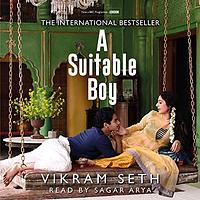Take a photo of a barcode or cover
3.5 stars.
I thought "War and Peace" would be the crowning literary achievement in my life. This is a close second. What. A. Long. Book. It was beautifully written and the characters were fully developed and wonderfully layered. That said, there is no need for this length! I know I could have put it down, but I am four books shy of finishing the "BBC's 100 books...." list and damn it, I'm going to finish.
I thought "War and Peace" would be the crowning literary achievement in my life. This is a close second. What. A. Long. Book. It was beautifully written and the characters were fully developed and wonderfully layered. That said, there is no need for this length! I know I could have put it down, but I am four books shy of finishing the "BBC's 100 books...." list and damn it, I'm going to finish.
The cultivation of love derived from kinds of people that should be together, is the initial spark and scene. Lata and family are characterized in the arranged marriage of her sister. Quickly it becomes about finding a suitable boy for Lata, and the narrative unfurls from this heart to characterize a number of suitors and seemingly peripheral components, many of them ideologues, found in the core and extended family, which then proceed to converge like petals around a flower.
In that way, the core story reminded me of Jane Austen’s Pride and Prejudice. The plot does a great job of shifting the suitors about and showing their character. One day approaching the auspicious, the other on a downward spiral. Both in terms of Lata’s perception of them and their fortunes in the world. Conversely, we also get more meatier chunks dedicated to Maan, a member of the extended family whose story seems the superfluous component. He doesn’t appear to be suitable at all. Rather the opposite, and a sharp contrast.
It’s very helpful, I think, to think of this as the dramatic plot components of something romantic coupled to a philosophical interrogation of passion itself. Manifesting the very best and worst of people. And the many plot threads also form an encapsulation of “New India”, as it is often referred to in fiction. Out of adolescence, the country itself is struggling as Lata does. Separation from parental figures. Becoming an adult. Educating oneself. Asserting boundaries and cultivating a sense of self. All this comes into the political sections, which are not long, and probably the hardest to get through, if for no other reason than the rest of it I found to be completely enthralling.
I read this like I was raptured. I always seem to read much more slowly when I like it a lot. Soaking in every detail and luxuriating in the actual experience of consuming prose work that is just exactly to my taste. Granted, this was still the case with the political parts, but not as much. My qualms, of course, were tramped down as, again, the innocuous became extremely pertinent to the themes of the novel, and paralleled the plot nicely. It is intricately plotted, exceptionally well written, wildly, too-easily readable, and exactly subjective and prescriptive as a novel ought to be, in my humble opinion.
With a cheeky epigraph showing two signs of the same coin: The superfluous, that very necessary thing…; The secret to being a bore is to say everything, turns out to be a very true thing. Actually, I again and again I wondered why a Gibran quote wasn’t in the epigraph. One—my favourite—is a perfect match to this fiction, and what I’ll leave you with:
“Your reason and your passion are the rudder and the sails of your seafaring soul.
If either your sails or your rudder be broken, you can but toss and drift, or else be held at a standstill in mid-seas.
For reason, ruling alone, is a force confining and passion, unattended, is a flame that burns to its own destruction.”
In that way, the core story reminded me of Jane Austen’s Pride and Prejudice. The plot does a great job of shifting the suitors about and showing their character. One day approaching the auspicious, the other on a downward spiral. Both in terms of Lata’s perception of them and their fortunes in the world. Conversely, we also get more meatier chunks dedicated to Maan, a member of the extended family whose story seems the superfluous component. He doesn’t appear to be suitable at all. Rather the opposite, and a sharp contrast.
It’s very helpful, I think, to think of this as the dramatic plot components of something romantic coupled to a philosophical interrogation of passion itself. Manifesting the very best and worst of people. And the many plot threads also form an encapsulation of “New India”, as it is often referred to in fiction. Out of adolescence, the country itself is struggling as Lata does. Separation from parental figures. Becoming an adult. Educating oneself. Asserting boundaries and cultivating a sense of self. All this comes into the political sections, which are not long, and probably the hardest to get through, if for no other reason than the rest of it I found to be completely enthralling.
I read this like I was raptured. I always seem to read much more slowly when I like it a lot. Soaking in every detail and luxuriating in the actual experience of consuming prose work that is just exactly to my taste. Granted, this was still the case with the political parts, but not as much. My qualms, of course, were tramped down as, again, the innocuous became extremely pertinent to the themes of the novel, and paralleled the plot nicely. It is intricately plotted, exceptionally well written, wildly, too-easily readable, and exactly subjective and prescriptive as a novel ought to be, in my humble opinion.
With a cheeky epigraph showing two signs of the same coin: The superfluous, that very necessary thing…; The secret to being a bore is to say everything, turns out to be a very true thing. Actually, I again and again I wondered why a Gibran quote wasn’t in the epigraph. One—my favourite—is a perfect match to this fiction, and what I’ll leave you with:
“Your reason and your passion are the rudder and the sails of your seafaring soul.
If either your sails or your rudder be broken, you can but toss and drift, or else be held at a standstill in mid-seas.
For reason, ruling alone, is a force confining and passion, unattended, is a flame that burns to its own destruction.”
A suitable boy might be one of the lengthiest book I have ever read, and I do take undue pride in that. The book starts solid, with perfect setting and unrelenting pacing. Though, there were no darker characters, I failed to spot any truly negative characters. For the first 1000 pages, it was a breeze. I enjoyed his prose, which fluctuates between perfectly crafted lines to cliched and over used rhyming poetry. After 1200 pages, the story began to flutter. It lost its core, it became repetitive and careless. I wish it could have given me a better ending, but overall it was worth reading it.
I bought this book as a birthday gift to myself because it was on my list of "important books to read." Reading (and finishing!) this book was not easy and I ended up utilizing my physical copy, my Kindle, and the Kindle app on my phone (and tried to update my progress on GR.) In the end it was well worth it! Seth offers a vivid and sometimes excruciatingly detailed account of India in the 1950s that encompasses the social, political, cultural and personal. There was quite a learning curve for someone not overly familiar with Indian culture and politics, but that was something I enjoyed most about this book: it forced me to broaden my horizons and investigate different points of view and to learn. Google was a necessary reading partner.
Seth leaves no stone unturned as he unravels a thread of humanity that unites each character introduced and their role in the central plot. Around the 700 page mark I knew the choice Lata would make but I also wanted to see how the story would unfold. 700 pages later I was glad that I did. A Suitable Boy always felt like a beast that I would never be able to tackle but I am so pleased that I powered through. I have seen lots of reviews suggesting it would be better if Seth had cut portions of the novel but I strongly disagree. Each section, each character felt like a necessary narrative thread that created a rich (perhaps at times too rich) experience. I am now prepared to be among the crowd of readers begging for A Suitable Girl!
Be warned this book will fill you with a desire to come up with couplet after couplet.
Seth leaves no stone unturned as he unravels a thread of humanity that unites each character introduced and their role in the central plot. Around the 700 page mark I knew the choice Lata would make but I also wanted to see how the story would unfold. 700 pages later I was glad that I did. A Suitable Boy always felt like a beast that I would never be able to tackle but I am so pleased that I powered through. I have seen lots of reviews suggesting it would be better if Seth had cut portions of the novel but I strongly disagree. Each section, each character felt like a necessary narrative thread that created a rich (perhaps at times too rich) experience. I am now prepared to be among the crowd of readers begging for A Suitable Girl!
Be warned this book will fill you with a desire to come up with couplet after couplet.
I enjoyed this book, even though it took me forever to finish it due to the length and its lack of portability (please make a Kindle version!). I had to return it to the library and put another hold on it in order to be able to finish it, and this is not a great book in which to lose track of characters and plot threads, as there are many. Nonetheless, I persevered, and it was worth it.
This is an epic book telling the story of four (and more) families over the course of roughly a year (1951-1952) in India. The title refers to the character Lata and her mother's quest to find a suitable boy for her to marry, but it ranges far and wide and has a third-person omniscient narrator. Some parts, which delved into the politics of the day, I found dry and sometimes difficult to follow, but they were more or less related to the rest of the plot. I particularly found the segments with the Chatterji family enjoyable, as well as the series of plot twists that crop up in the last few hundred pages. Not all of the loose ends are tied up, but then Seth has apparently been working on a sequel due out in 2016. I would actually consider reading it, even if it's another 1,500-page behemoth, which is a testament to how much I enjoyed the characters in this one.
I am guessing some readers are disappointed that Lata ends up with Haresh, especially as it seems like primarily a rash decision to spite her brother. But I thought Seth handled it masterfully. In the end, Lata's choice was the most likely one, even if not the most romantic, and Seth still gives us Malati to give voice to the reader's feelings and have Lata respond to them. Plus he has been showing us since the beginning of the book how being in a marriage based on practicality (Pran and Savita's) can be incredibly sweet and life-giving even when not based on passion. I look forward to seeing how he develops Lata and Haresh's relationship in the next book.
This doesn't make my favorites list, but it was worth the long (long, long) read and I'd recommend it. Maybe hold out until it's available on Kindle, though...
This is an epic book telling the story of four (and more) families over the course of roughly a year (1951-1952) in India. The title refers to the character Lata and her mother's quest to find a suitable boy for her to marry, but it ranges far and wide and has a third-person omniscient narrator. Some parts, which delved into the politics of the day, I found dry and sometimes difficult to follow, but they were more or less related to the rest of the plot. I particularly found the segments with the Chatterji family enjoyable, as well as the series of plot twists that crop up in the last few hundred pages. Not all of the loose ends are tied up, but then Seth has apparently been working on a sequel due out in 2016. I would actually consider reading it, even if it's another 1,500-page behemoth, which is a testament to how much I enjoyed the characters in this one.
This doesn't make my favorites list, but it was worth the long (long, long) read and I'd recommend it. Maybe hold out until it's available on Kindle, though...
emotional
funny
reflective
slow-paced
Plot or Character Driven:
Character
Strong character development:
Yes
Loveable characters:
Complicated
Diverse cast of characters:
Yes
Flaws of characters a main focus:
Yes
a book more deserving of the title "a little life" than a little life.
I listen to many of the books I read, and this one is more of a production. The content is pretty good, but I'm not thrilled with this highly produced version. It's harder to know who's talking and what's going on.
Finally finished this book, and it is officially the first book that I think would be much better listened to than read. That being said, it was still a good book.
Finally finished this book, and it is officially the first book that I think would be much better listened to than read. That being said, it was still a good book.
emotional
hopeful
lighthearted
reflective
slow-paced
Plot or Character Driven:
Character
Strong character development:
Yes
Loveable characters:
Yes
Diverse cast of characters:
Yes
Flaws of characters a main focus:
Yes
skoraj 1500 str je končno za mano! zgodba se na videz vrti okrog vdovele matere, ki želi za najmlajšo hčerko najti primernega moža. v resnici pa bralcu razkriva precej kaotično podobo povojne indije z vseh možnih vidikov družbenega, političnega in kulturnega življenja. izvrstno napisana, polna detajlov.





